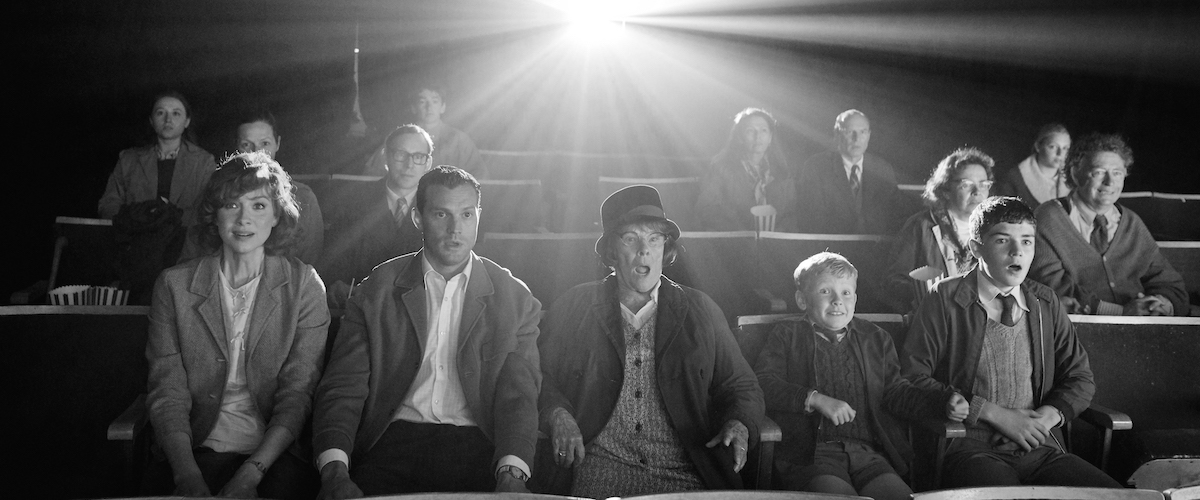
In the opening scenes of Kenneth Branagh’s semi-autobiographical Belfast, a pretty young mother (Catriona Balfe) calls her son to supper. The year is 1969. The little boy (Jude Hill) is playing dragon slayer down the street with some friends—he even has a makeshift shield—and, one by one, neighbors pass along the message to him. As he leaves his friends, happily galloping home, he’s greeted by yet more neighbors, all of whom know him by name. It’s an absolutely idyllic scene of a childhood in a tightknit, working-class Irish community.
Then the little boy stops dead in his tracks, gaping at what he sees: A gang of anti-Catholic marauders have marched onto the street, looking for trouble. They throw rocks and Molotov cocktails and light a car on fire. The boy’s mother rushes onto the street to collect him, scooping him up and using his shield to protect them both from flying debris. They make it inside where the boy and his older brother (Lewis McAskie) hide under a table.
This opening scene is pretty much Belfast in a nutshell: A wonderful childhood disrupted by religious discrimination and violent unrest. Along with his mother and brother, young Buddy lives with a sassy grandmother (Judi Dench) and a doting grandfather (Ciarán Hinds). His sturdy, decent father (Jamie Dornan) isn’t often home—a construction worker, he goes where the work takes him. Despite this, Buddy’s parents are not just still in love, they’re still hot for each other (can you blame them?)—often kissing and dancing closely at street parties as neighbors look on admiringly. (At one point, Pa performs a swoon-worthy rendition of “Everlasting Love” just for his bride.) As for Buddy, he’s got a crush on a nice girl at school (she’s Catholic; he’s Protestant) and he woos her in the most charming way, showing up at her door with a fistful of wildflowers and studying extra hard at school so he can sit next to her in class.
Sometimes the family goes to the cinema together—a Raquel Welch film (Pa’s choice) and then Chitty Chitty Bang Bang, which the entire family watches with wide-eyed delight—and we can see how powerful those outings would’ve been to a budding young filmmaker.
It’s hard not to enjoy Belfast. It’s beautifully shot in crisp black and white, the acting is wonderful—on top of those reliable old hands Dench and Hinds, frecklefaced Hill is a natural charmer—and it overflows with affection and good humor. But for my money, Branagh lays it all on a bit too thick: It’s like, we get it: Your childhood was nearly perfect—your parents were hot; your grandparents were kindly and wise; you lived on a street where Catholics and Protestants lived harmoniously; you weren’t rich with money, but you were rich in love, etc.—and then it all got ruined by hate.
It all feels overly simplistic and, perhaps, a little too rose-colored (even if the threat of violence does loom). Belfast is Branagh’s love letter to his family, his neighborhood, a way of life that doesn’t exist any longer. It’s neither complex nor rigorous—nostalgia rarely is—but it does leave a lump in the throat.
